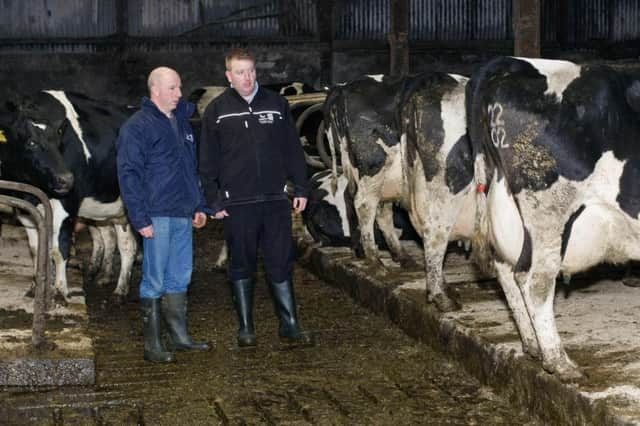Breeding cows for the system


After a couple of years building the herd they felt that they were not progressing as anticipated. Alan said: “We made the decision at that time to go for the British Friesian breed. The farm is heavy land so cows are in at night all year round. We wanted a herd of robust cows that would produce well from grass, have some value in cull cows and male calves and be easily managed.”
Quite a tall order! But a visit from Conor Loughran, from Genus ABS, helped to find the solution.
Advertisement
Advertisement
Conor explained to Alan that the use of a purchased sire meant a “one size fits all” policy. If he wanted to make progress he needed to match sires to individual cows to improve the weak aspects and build on the positive aspects of each animal.


Alan remarked: “I could understand the point that Conor was making but at the time the Genomate program sounded like a long-term way of building the herd. However, when I see the batches of very uniform young heifers coming on and the performance of those that are in their first lactation, I realise the value of the breeding program.”
In addition to his 7,200 litres milk yield on 1.85 tonne of meal, a butterfat of 4.10 and a protein figure of 3.48 the herd has a calving interval of 387 days. Alan is also pleased with the demand for beef calves from the herd. He is using Limousin and some British Blue on the cows that are not used for breeding herd replacements, and there is keen demand for these beef heifers which are sold when they are ready for bulling.
Conor added: ”Since starting the Genomate program the heifer yields have improved by 1,000 litres year on year and the average heifer classification score has risen from 75.2 to 81.67.”
Advertisement
Advertisement
Conor goes on to outline some of the very special animals in the herd pointing out that the most recent herd classification highlighted two EX94 cows. One of these, Dungormley Loyal Judith 2nd, is the highest classified daughter of Blackisle Ben Loyal in the world. Dungormley Karen, a Hilton daughter is the 11th highest PLI calf in the British Friesian breed. Sires currently being used in the herd include Deangate Quentin, Blackisle Ben Loyal, Hilton and Solo.


Conor is keen to point out that 18 of the top 20 PLI British Friesian cows in the UK have been bred by Genus ABS sires while eight of the top 10 birth registered calves are also by Genus ABS sires. Indeed Genus ABS has eight of the top 10 British Friesian PLI sires available today.
Alan’s final comment sums up the program.
“There are so many traits which are considered in the Genomate programme, there is no way an individual farmer could deal with all of this data and avoid inbreeding etc. It is very convenient to have all of this information processed for you and presented in a simple easily understood format.”
In the Genomate program Genus ABS takes all the data handling aspects of the decision making process to generate a plan. The output is a simple and easy to follow report based on the best information available.
Advertisement
Advertisement
All the cows in the herd are evaluated on production information, 15 type traits along with 11 supplementary characteristics and details of full pedigrees going back seven generations. The program ranks the cows in the herd on the data provided and produces a list of first and second choice potential bulls that suit each cow, correcting type faults, improving management and production traits and eliminating any risk of inbreeding.”
For further information on Genomate contact your Genus ABS representative or contact 028 3833 1451.